By Lambert Strether of Corrente
Nagashiki Shipping’s Capesize bulk carrier Wakashio, which, loaded with oil, ran aground on a reef off Pointe Desny[1], southeast Mauritius, on July 25, 22 days ago, broke in two today.[2] Here’s before-and-after satellite imagery:
Situation just went from bad to worse yesterday in Mauritius as the hull of the WAKASHIO snapped like a twig. These photos were taken just 3 hours apart thanks to @planetlabs unique ability to rapidly revisit (in hi-res) any same spot on Earth multiple times a day. #SkySat pic.twitter.com/x0b9KDo0Cj
— TankerTrackers.com, Inc.⚓️? (@TankerTrackers) August 16, 2020
Here’s a close-up image of the Wakashio:
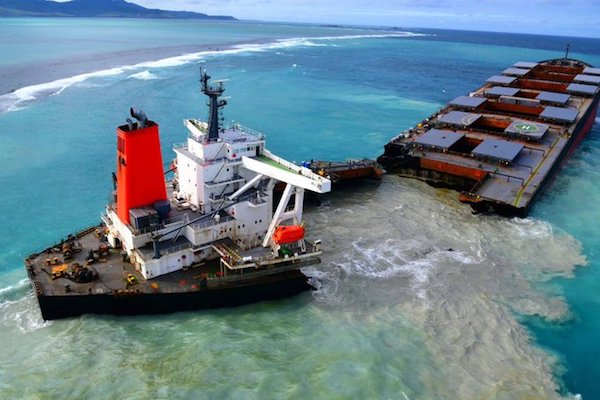
And here’s an aerial view, showing the nasty effects of oil on Mauritius’ turquoise water:
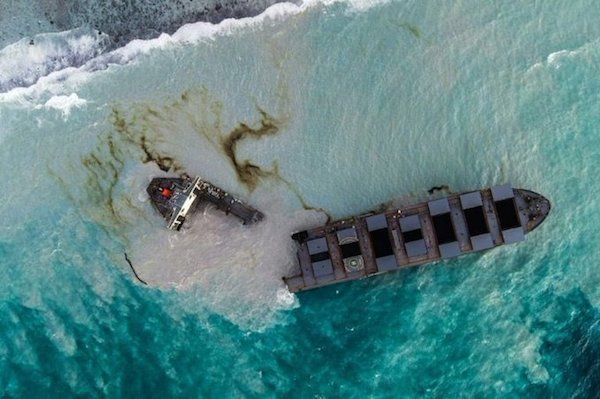
(Most of the oil was removed from the tanker before it broke up, so this photo shows the vile residue.) A few days ago, Yves covered the grounding, the ecological effects, the (mostly successful) efforts to pump the low sulfur and diesel oil out of the ship to keep it out of the ocean, and the volunteer efforts to clean up the oil that did escape; she also gave a link to a crowd-funding site for cleaning and protecting the Mahebourg Lagoon[3] where the oil spilled. In this post, I’ll look at what we know today about how the Wakashio ran aground, the nature of the oil spill, and compensation for the spill.
How and Why the Wakashio Ran Aground
One’s first thought (well, my first thought) was the oddity of a ship grounding on an island in the middle of nowhere. In fact:
Mauritius is next to one of the world’s most concentrated shipping lanes, which connects Asia, Africa, Europe and Latin America. During the month of July, more than 2,000 vessels passed close by the Mauritian coast.
Bloomberg writes, in “Why So Much World Trade Passes Mauritius’s Pristine Beaches“:
[Mauritius lies] on the shortest straight-line route between the Strait of Malacca, which links the ports of Asia to the Indian Ocean, and the southern tip of Africa. That also makes it the route of choice for shipping between the huge markets and manufacturing centers of China, Japan, South Korea and the rest of Asia in the east, and the resource-rich regions of West Africa and Latin America, or the markets of Europe and North America, in the west.
In short, if a freighter is sailing between the eastern and western hemispheres, there’s a good chance that it will get somewhere close to the island. The main alternative route is to navigate Egypt’s Suez Canal.
Of course, “close to the island” should not mean “colliding with the island,” and so the question becomes why the Wakashio’s voyage ended in disaster. There seem to be two points of failure:
1) The change of course on July 21. Forbes provides satellite-driven data analytics on the course change:
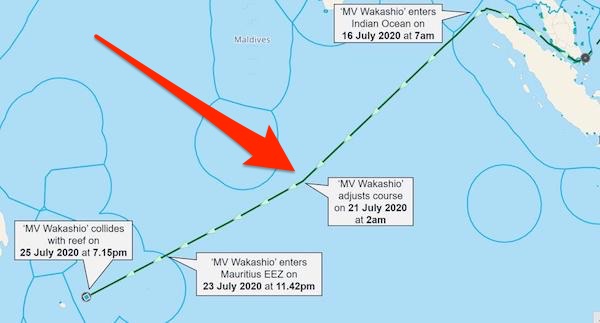
So far, nobody knows why the change of course occurred. From Splash 24/7, “Countdown to disaster: why did the Wakashio deviate from its intended course?”
What also remains unclear is the decision taken by the Wakashio to deviate course on July 21. Vessel tracking from Splash partner MarineTraffic clearly shows that early in the morning of July 21, the newcastlemax [a Capesize hull form] owned by Japan’s Nagashiki Shipping, changed route, putting it on a collision course with the pristine shores of the island republic of Mauritius.
And in fact, the captain believed he was on the right course:
As Splash has earlier reported, the coast guard in Mauritius had tried in vain to contact the ship’s captain for an hour on the evening of July 25 to warn that its routing looked dangerous. When finally coast guard officials got through to the master, the captain insisted the planned route was safe. A few minutes later, however, the ship radioed local authorities to say the vessel had grounded on a reef.
(Apparently, the course was meant to keep the Wakashio ten miles from shore, which to me is cutting it pretty close to me in a big ocean). And the second point of failure–
2) The debacle on the reef. Posters at an entertaining forum on gCaptain (which seems to be the maritime equivalent of PPRUNE) point out that if the Captain had looked out the window, he would have seen lights; the lights, in fact, of Sir Seewoosagur Ramgoolam International Airport, the main international airport in Mauritius:
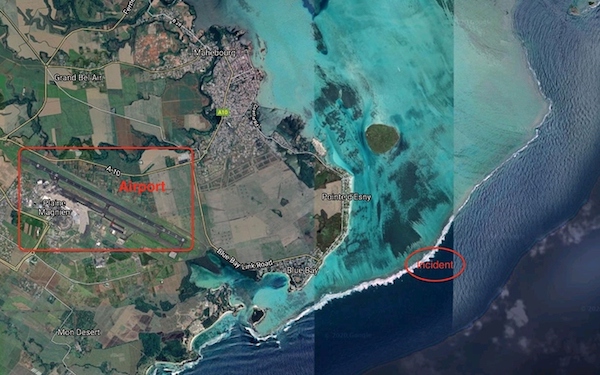
They also point that that had the caption taken a trip out onto the bridge wing and listened, “those breakers could probably be heard miles away.”
So what happened? The answer is not edifying (and will cost Nagashiki Shipping’s insurer a good deal of money, if there’s any justice in the world. From Splash 24/7, “Birthday party and quest for wifi revealed in lead up to Wakashio grounding off Mauritius“:
The 58-year-old captain of the ill-fated newcastlemax Wakashio could face negligence charges after it emerged the crew were celebrating a crewmember’s birthday and had headed nearer towards the Mauritius coastline to get a wifi signal just prior to the bulk carrier’s grounding on a reef off the island’s south coast.
The bombshell revelations – first reported by local newspaper L’Express – come from investigators who have interviewed the crew of the Japanese-owned, Panamanian-flagged ship.
The party also explains why local authorities tried “in vain to contact the ship ahead of the accident to warn it was on the wrong course,” and why nobody looked out the window or walked out on the wing of the bridge.
(Here I will interject that blaming the workers is always easy, especially given the temptation to moralize over partying. Debacles like this are generally the ugly conclusion of “a series of missteps,” and here we really need to know why the course change happened, and we don’t.)
The Nature of the Oil Spill
Here is a view of the spill:
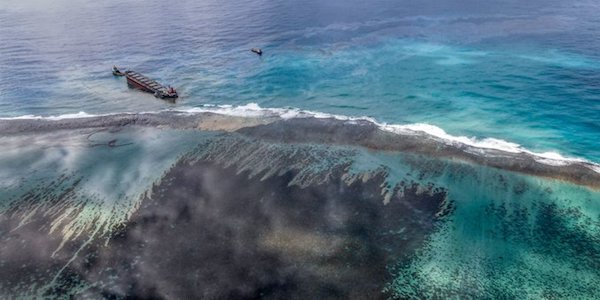
Here is drone footage of the spill:
A drone footage showing the extent of the oil spill in Mauritius by the bulk carrier, MV Wakashio.
Here’s a (regulary updated) carrd with more in-depth information and several links on how to help, please spread ??: https://t.co/8HHKN5F4QZpic.twitter.com/djHjRFzx7N
— BTS Mauritius⁷ (@BTSMauritius) August 10, 2020
Here is what the spill looks like on the beach, when collected in buckets:
A Mauritius resident shows dozens of buckets and drums filled to the brim with sandy oil on the beaches as volunteers try to clean up the spill pic.twitter.com/5viFSH7Gag
— Reuters (@Reuters) August 12, 2020
And here is a map of the ten-square-miles spill from Reuters:
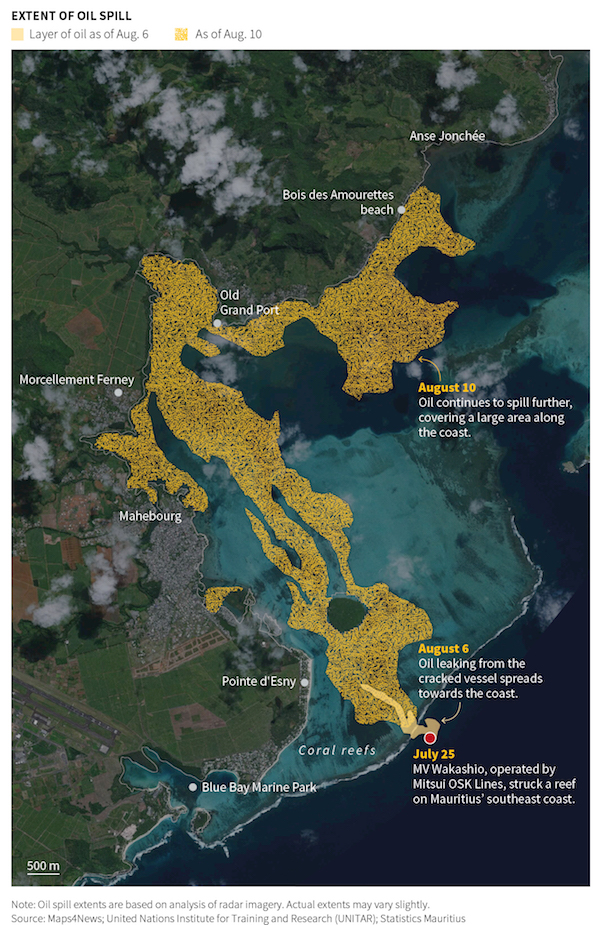
The ecological effects of the spill wil not be good, as the BBC points out:
“There are very few such marine areas with such rich biodiversity left on the planet. An oil spill like this will impact almost everything there,” said Dr Corina Ciocan, a senior lecturer in marine biology at the UK’s University of Brighton.
“It is not just about the light oil slick you see on the surface of the water caused by the spill.
“There will also be soluble compounds from the oil that will dissolve in the water, a mousse-like layer underneath the surface of the water, and then very heavy residues on the bed – so the entire marine ecosystem will be affected.”
Forbes has an excellent explainer on the actual oil spilled, in Nishan Degnarain’s “Toxic In The Tropics: The Invisible Killer Now In Mauritian Waters After Major Heavy Oil Spill“:
In the case of the Wakashio in Mauritius, the vessel appears to have been carrying the heaviest type of bunker fuel, No 6 (Grade C) fuel, that requires special handling for cleanup operations, as NOAA’s guidelines for No 6 (Grade C) bunker fuel oil spills indicate.
Although Heavy Fuel Oil is the most common form of oil used in shipping, there is significant controversy about its use and there have been strong efforts to have it banned both in order to meet Climate Change commitments, as well as the risk to the environment. Spills from Heavy Fuel Oil are more common than Crude Oil spills due to vessel accidents, poor maintenance or vessels cleaning their engines illegally at sea, so do not receive as much media coverage. Although visually, Heavy Fuel Oil Spills are much lower volumes than Crude Oil spills (as vessels are not transporting oil), so spills are a lot less visible on the ocean surface, they can be extremely toxic.
The risk of HFO spills are so toxic that the they are already banned from Antarctica (just South of Mauritius) and the international shipping regulator, the International Maritime Organization based in London, is finalizing plans to have it banned from the Arctic in the next few years due to the fragile nature of the Arctic ecosystem, and high exposure to ultraviolet light from the sun, that makes it even more lethal.
Unfortunately for Mauritius, the situation is even worse than Degnarain makes out: The oil is not merely bunker fuel, but low sulfur bunker fuel, which is even harder to clean up than horrid normal bunker fuel. From a report by SINTEF, a Norwegian research company, “Characterization of Low Sulfur Fuel Oils (LSFO) – A new generation of marine fuel oils” (PDF):
The [Low Sulfur Fuel Oils (LSFOs)] investigated in this project and previous limited studies have showed a wide span in the oil properties with relevance to behaviour when spilled at sea. Moreover, the oils tested indicate a high degree of persistence on the sea surface, and the oil spill response can even be more challenging than the previous traditional intermediately fuels oils (e.g. IFO180 / 380), particularly in cold water spill situations:
- The effectiveness of using dispersants may be limited due to either high viscosities of the emulsions and/or high pour point of the oils
- The potential for use of ISB can be limited as the ignitability may be slow (i.e. extended ignition time) due to low contents of volatiles. Small amount of water uptake (emulsification) may also prevent the oil to be ignited without use of significant amount of primers (e.g. diesel)
- The effectiveness of mechanical recovery is dependent on the choice of skimmer system that force contact between the oil and the recovery unit. Oils with high pour points will e.g. need an “active” high viscosity or belt skimmer designated for solidified oils at sea
The cosmic irony here is that the shipping industry has been switching to low sulfur fuel in order to reduce its very bad contribution to air pollution.
Compensation for the Spill
Finally there is the issue of how much Nagashiki Shipping will compensate Mauritius for the spill. From Agence France Presse:
The ship’s owner has meanwhile pledged to “sincerely” respond to requests for compensation over damage to the marine environment.
“We are deeply conscious of our responsibility as a party directly involved in the case,” said Kiyoaki Nagashiki, president of Nagashiki Shipping.
“Regarding compensation, we plan to deal with the issue sincerely based on applicable laws,” the head of the Okayama-based company said in a statement.
(If I heard a US firm pledge to do something “sincerely” I’d run screaming from the room, but I don’t know the implication of that choice of words for a Japanese firm.) Of course, taking responsibility means putting a number on the damage, which may take a long time. From the Japan Times:
Nagashiki Shipping will bear the liability for damages as it owns the ship…
Two treaties regarding marine accidents require ship owners to purchase a public liability policy, while setting a limit on the amount of damages a ship owner pays.
With the insurance policy Nagashiki Shipping holds, the company is expected to be asked to pay up to $1 billion (¥107 billion), over the oil spill. There is no limit on costs the company has to pay to remove the vessel.
The amount of damages may be limited to about ¥2 billion based on the treaties. But Nagashiki Shipping may have to pay more if its serious faults are found, according to an insurance industry employee.
Nagashiki Shipping may have to pay compensation for damage to wildlife as well as people in the fishing and tourism industries. It is likely to take time to determine the total amount of damages.
Tourism generated 63 billion rupees (¥168 billion) for the economy last year.
I don’t know how to sort this out; the difference between ¥2 billion vs. ¥107 billion vs. ¥168 billion (per year, albeit pre-Covid) is pretty big. Then again, the whole question of whether monetary compensation for ecological damage is even possible. From the Mauritius Times, “Prof Christian Bueger: ‘Mauritius will receive some basic compensation. But how do you calculate the price of restoring a marine habitat, or the cost of a dead bird?‘”
Based on other oil spill litigation cases, financial compensation will firstly take a long time. The destruction needs to be economically calculated, and responsibilities and obligations clarified. Mauritius will receive some basic compensation.
Yet, how do you calculate the value of an eco-system, the price of restoring a marine habitat, or the cost of a dead bird? Whatever compensation received it will not do justice to the damage done. Ocean recovery will take years, if not decades. And let’s not forget the reputational damage, and the consequences for tourism in Mauritius as well.
(This feeds into the whole question of “ecological services,” a term rife among Blue Economy proponents, which in my understanding assumes, even demands, that a price be put on such services.)
Conclusion
I hope Mauritius gets plenty of help with international relief[4], plus a nice chunk of change from Japan, even if it’s not precisely calculable. And it’s tragic that the very human desire for a WiFi connection to crew’s families, and a birthday party, had such an outcome[5]. Finally, it really would be better to leave the oil in the ground.
NOTES
[1] Kyodo News: “Pointe d’Esny, an area designated as a wetland of international importance under the Ramsar Convention, which is close to Blue Bay Marine Park, another Ramsar site.”
[2] The oil leakage proper started on August 6.
[3] CBS, quoting Jean Hugue Gardenne of the Mauritian Wildlife Foundation: “We have planted about 200,000 indigenous trees to restore the coastal forest. We re-introduced endangered birds, including the pink pigeon, the olive white-eye and the critically endangered Mauritius fody to the Isle aux Aigrettes. Now all this is threatened as the oil is seeping into the soil and the coral reefs.” See here at NC on coral reefs, here on mangrove forests, and here on coastal estuaries.
[4] Mauritius also occupies a strategic position in the Indian Ocean, near Diego Garcia. There’s no suggestion this had an impact on the grounding, but it may have affected the nature of the relief effort — no British or US help, other than US embassy volunteers helping to clean the beaches — but help from India and France.
[5] I have not looked into the actions of the Mauritian government, because a lot of the material is in French, which I don’t read. However, gGaptain, in “Wakashio Grounding and Oil Spill: Was the Mauritian Government Unprepared?” provides a bill of particulars and answers that Mauritius was prepared, given its capacity as an island nation of 1.3 million people. This is also the first time Mauritius has been hit with an oil spill.


I believe there is no compensation adequate to remedy or undo the damages of this spill. I also believe it is difficult to condemn a nation other than my own in such transgressions. All I can do is to be appalled and deeply deeply saddened by what has happened. That is of little consequence to so many creatures harmed by this disaster.
Colonel Smithers: what a profoundly sorrowful event. Deep thanks to the people there for their efforts to save the extraordinary and rare biodiversity of Mauritius.
This is stunning this. It sounds like there was nobody on the bridge at the time to look out the window or else they would have seen the danger. Isn’t that illegal or something? But do not ships have anti-collision alerts like aircraft? Come to think of it, when the ship changed course, there should perhaps be a display that states that it is a collision course with a piece of land. With satellite navigation, this should not be a challenge. But all this is reading like no lessons were learned from the 2012 “Costa Concordia” disaster.
The captain of the vessel bears 100% responsibility for this (then the owner and the insurer).
There are reports that the Captain was having a birthday party, at the time???
Also; on one video, the 2 anchors are still up, so were not used to stop it.
The coast guards didn’t intervene, just foned, but got no answer, so they went to sleep
It wouod have been helpful to have included a link to the video. All the other information is in the post. Did you read it?
Finally, it really would be better to leave the oil in the ground.
Amen. Let us make it so.
Thank you for this. Lambert. My good wishes to our Col Smithers, to Mlle McCumber (my French teacher of ome years ago) and to all Mauritians. Leave the oil in the ground.
Why leave on ground?
In the ground. Don’t pump it out. Use alternative, less polluting fuels.
The sea at Night:
It is easy to mistake one light as another. Mistakes happen.
Agreed that the sea at night is its own environment but would love to know if anybody was actually looking at the radar screen. That display would have told its own story. Was anybody near that screen at all? Was anybody actually in the bridge at the time?
I’d be interested if there is anyone in the commentariat with experience/knowledge of Maritime Conventions on navigation and how they are applied on a modern vessel. I’ve always assumed that even on the most up to date vessels there is still a requirement for permanent monitoring of radar and other instruments and that something as big as Mauritius is hardly going to go unnoticed on the screen.
On the basis of the information we’ve seen so far, its hard to look far beyond a grossly negligent captain and senior officers. But even if this is so, this does not exempt the ship owners. I recall reading an account a few years ago of a cargo ship’s loss in a hurricane, based largely on poor judgement from the captain – but it does appear that this particular officer had been put under extreme pressure from the owners as he had previously been judged to be ‘too cautious’ and had cost the company a lot of money when he refused to set to sea in storms.
All vessels underway require a constant watch. When I started out at sea there would have been at least two, an Officer of the Watch and a rating, in case one is incapacitated, falls asleep or is otherwise distracted.
However crew numbers are determined by the Flag State, which sets a minimum (safe manning), this is often not enough to carry out all the duties on the ship but is only the bare minimum to provide watches and keep everyone feed, watered and underway. But as this is the legal requirement Shipping Companies save costs by reducing the crew, to at or just above, it. This leads to single handed watches and accidents and groundings.
The electronic navigations systems may have actually made this worst.
Mistakes do happen, all the time, but when you’re dealing with consequences of this magnitude, one mistake should not be enough. Generally you deal with it by having a whole system of checks and reviews, and checks for the checks, such that nothing less than a whole series of failures can cause an outcome as disastrous as this one.
It would be interesting to know whether such a process was in place for this one, and whether such a series of mistakes did indeed occur. If there was no process, and just the captain making a mistake was enough to cause this to happen, then we are dealing with an inherently fragile system that will inevitably produce incidents like this, not just once but over and over.
> nothing less than a whole series of failures
There’s always a cascade of errors. Nonetheless, the birthday party was egregious. You’ve got to answer the phone even if you’re 100% certain you’re on the right course!
I once had a fascination for reading aviation accident reports, and as you say, nearly all, from 747’s down to amateur Cessna crashes, resulted from error cascades, or sometimes cascades arising from one key error (you could argue that a captain who does not bother to enforce good discipline among his bridge crew is ‘one’ error).
But occasionally single error accidents do occur. A couple of years ago an Irish coast guard rescue helicopter crashed because it seems the pilot made a simple, but catastrophic error when punching in a navigation waypoint during a night time emergency rescue (she seems to have confused two similar sounding waypoints). Sometimes things just happen, or otherwise very competent crew just get very unlucky that their one bad call coincides with bad luck.
I used to have the same fascination. The duplicate identifier doomed American Airlines 965
“they attempted to program the navigation computer for the next approach waypoint, Rozo. However, the Rozo Non-directional beacon (NDB) was identified as R on their charts. Colombia had duplicated the identifier for the Romeo NDB near Bogotá, and the computer’s list of stored waypoints did not include the Rozo NDB as “R”, but only under its full name “ROZO”. In cases where a country allowed duplicate identifiers, it often listed them with the largest city first. In other words, the “ROZO” waypoint should have been at the top of the FMS, as it was the nearest one, but in the case of Flight 965, it was not. Only several other waypoints that began with “R” were displayed. By picking the first “R” from the list, the captain caused the autopilot to start flying a course to Bogotá, resulting in the airplane turning east in a wide semicircle.”
Good question about whether anyone was actually on the bridge – for the quite some time it too to approach the island.
Mauritius has been there for some time. Its location would have been on any nav chart and GPS system. The GPS system’s gui would have indicated both the ship’s position and how close it would come to Mauritius when the course was changed. The ship’s proximity to land would also have been obvious had anyone monitored radar. There should have been some sort of collision warning system. Are not ship locations also monitored from the home office?
Had the ship merely maneuvered closer in order to get a better wifi signal, it should have been obvious that closer monitoring of the ship’s position, course, and speed would have been necessary. The rationale seems frivolous. It is also inconsistent with how tightly scheduled these ships are, and how both time and fuel consumption are monitored by owners. The course deviation would have consumed more of both. Captains have to explain that.
There’s plenty of potential blame to go round, but the first place to look is the captain’s conduct.
Hi,
Interesting article. Note that it is not the first time Mauritius is hit by an oil spill – it happened before but not as bad as it is now.
The name of the ship?
Back in the 1970s? Near Baie du Tombeau?
Now Mauritius will have to resort to bioremediation once it becomes difficult to physically or chemically clean the bulk of the spill. This means years and never complete removal because part of the spill will prove recalcitrant. The part that goes to the bottom or the parts that stick to rocks in the coast and the reefs will probably be the most long lasting damage. I know beautiful beaches in the North coast in Spain where you can see the rocks littered with many black spots. The ecosystem is killed.
Thank you very much for this informative post (try to find something like this in mainstream media). The most salient point is that in a word where everything is priced, it has to be admitted that in cases like this it is not only nearly impossible to come with a good price tag but that we tend to go on the cheap. There is a part that can be compensated and could be comprehensively accounted but there is damage that will never be compensated and this should be treated as a criminal offense. I think that not only the Japanese company but the freight industry as a whole is somehow responsible because they work with insurance schemes that are unable to cope with the damage they create. Too much for perfect markets, reasonable expectations and rational behaviour.
Scale this to the damage we are doing to the whole planet and there are not numbers with enough digits to cope with it. We are collectively imbecile.
Computer driven 737……
Computer driven Finance………
Computer driven Ship……….
Computer driven World……….
Humans, sit back and relax!
It should be pointed out that big bulk carriers are lost at a rate of around 5 per year. The most common cause is grounding, which implies navigation errors are responsible for nearly half of losses.
So it seems that this accident isn’t so unusual – its just particular bad luck that it occurred in such a sensitive location (or perhaps the other way of looking at it is that we’ve generally been lucky that most losses are in less sensitive locations).
Just doing a quick search indicates that by far the biggest factor in losses is the use of flags of convenience and older vessels. This doesn’t seem to apply so much with this accident, but perhaps we assume too much if we think that Japanese owners are more reputable and cautious than others.
Thank you, Lambert and the NC community.
The latest from Mauritius is that the break up of the ship progresses. The rear is now over 30 metres from the rest. Most of the oil has been removed, but what leaked has damaged the ecologically sensitive Ile aux Aigrettes and Blue Bay marine parks. There is no sign of oil drifting north towards the east coast, very important for the economy in terms of tourism and fishing, and the Islets and Bras d’Eau national parks, again ecologically sensitive, the area north of Anse Jonchee on the map. A handful of volunteers and / or residents have been hospitalised for respiratory problems. After doctors spoke out, the government asked volunteers to let the professionals get on with it and stay away for their own health and safety.
The French minister for overseas territories visited over the week-end. The French authorities are worried about the strong currents in the south taking the oil to nearby Ile la Reunion, formerly Isle de Bourbon. The minister professed surprise at how such an incident happened and the excuses being aired, including that the crew were afraid of pirates and needed to get close, so as to pick up signals. Some of these lame excuses are peddled by Mauritian ministers and officials, which makes one wonder why. Please see below.
French professionals are at the scene, but, at first, were fed up with Mauritian officials jockeying for leadership roles and delaying matters. Some of the French team threatened to leave.
That Bloomberg article is misleading. Unless on the west coast, so on the approaches to and fro Port-Louis, one rarely sees ships on the east and south coasts. Even when sailing, for five decades, with family and friends, so relatively far out, I have never seen any.
Further to me e-mailing Yves about local suspicion of a drugs drop gone wrong, soon after a local doctor reported that she spotted an abandoned boat (pirogue), life jackets etc. on the beach near the spill and reported it to the police. Upon her return the next day, her usual daily stroll on the beach with her family, no trace of the boat was to be found. The area had been tidied up. She was not asked to make a statement and not long after went to the press. Considering that many members of the prime minister’s circle, including close relatives, have been investigated for involvement in the drugs trade, essentially allowing Mauritius to be used for smuggling. That facilitation included a former president allowing presidential bank accounts to be used for muling. These drug runs tend to be on the west coast, facing Africa, not on the east coast, facing Australia.
The island was unprepared, but that is not a surprise. The wealthy dynasties that have ruled Mauritius since independence in 1968 rely on nepotism, patronage and communalism. Professionalism and merit don’t come into their equations. It was not inconceivable that such a thing could happen to a country that relies on so much maritime trade, especially as there was an incident in the same place in the late 19th century, and, therefore, steps were needed to mitigate the risk to tourism. One could not expect the playboy current and former PMs, who are sons of former PMs, to worry about such things. Their fathers bought them their tertiary qualifications.
Thanks so much for this – it all sounds a mess. As usual, it is ordinary people on the ground who are responding best.
Thank you, PK.
The former PM, called Macarena by long suffering Mauritians for locally obvious reasons, dossed about at Trinity and was awarded a degree after his dad, then PM, made a donation. That was about 50 years ago. Many Mauritians study there.
I forgot to add that two other developments aroused suspicion. In addition to the PM not doing anything for a fortnight after the ship hit the rocks, the police wasted similar time in boarding the vessel and questioning the crew and testing them for alcohol or other drug abuse. A lame excuse trotted out for that delay is that Mauritius had no jurisdiction, even with the ship a few hundred metres, not miles, off shore. That excuse has been used by the authorities, all politicised, to avoid intercepting drugs couriers at sea, even in Mauritian waters. Mauritius is a family business masquerading as a democracy, albeit relatively prosperous for a third world country.
In 1901, the Dalblair ran on to the reef at the same place. There are light houses in Mahebourg and further south to warn ships.
Thank you for these reports, Colonel. Excellent journalism from NC!
Do it is still possible that the vessel changed its route to pass close enough To Mauritius to get some funny stuff from local smugglers and even to get an extra bonus on destination. That sounds to me more likely than trying to get WiFi.
> trying to get WiFi
Other sources cited the same reason. If I were at sea without WiFi for X number of dies, I would go mad. I think wanting to connect to one’s family during a long voyage is a perfectly valid reason, and good for crew morale, too. (Not just for sentimental reasons, either; money, business, illness, the pandemic, etc.)
Mauritius was THE entrypoint for any and all dollar transactions the entire Indian economy handles! (Not a small figure). Mauritius was to India what Cayman is to Wall Street, ok. It makes sense government is on “easy street” as far as on the ground governance is concerned.
However, that tax treaty has since been obsoleted in the past year, i think. (now it’s to singapore i think).
Best part is that the people of mauritius keep voting them… ha!
Garbage in and garbage out.. been like this since 1968
The current PM consumes drugs with his wife.. common knowledge and was even admitted by his father Anerood Jugnauth… what did people there expect!!!!
Majority are indians in mauritius and they will keep doing the same thing over and over and over again… its simply a wrotten place… f.u.c.k.e.d u.p
> a drugs drop gone wrong,
I dunno. Why does it make sense to bring a bulker in so close, if a small boat could go farther out? Surely there are small boats (like “cigarette boats”) optimized for such a purpose?
how is it possible to prevent human error or stupidity ?
If the master changes course to
Get a wifi signal from the Shore.
Just criminal!
Was the Wakashio double hulled???
Aren’t there requirements for tankers carrying this type of toxic gunk to be double-hulled?
awful.
The Wakashio is said to be double hulled. From Reuters:
many thanks! If it was double-hulled, and at low near-port speeds, breaching the FIRST hull would be enough to stop the ship one would’ve hoped!
Captain and Another Officer have bern arrested.no bail granted. Most
Of above Comments are nonsens and waste of Time. Pure criminal
Behaviour.thats all.
Whats Next, colonel smithers ?
LSFO has different characteristic from HFO. For example It has a high pour point representatively so It caused solidification which makes hard to collect spilled oil. Are there any issue or information about difficulty of collect oil using Existing Equipments and resources in mauritius?